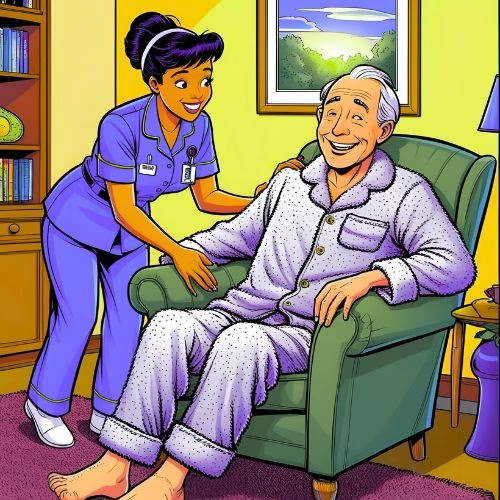🌱 Introduction: Why Disability Rights Are a Lifeline When You’re Housebound
Suppose you’re housebound due to chronic illness, disability, or mental health. In that case, the world can feel like it’s steadily shrinking. Meanwhile, the forms, refusals, and shrugged shoulders just keep piling up. It’s exhausting. And when even basic care becomes difficult to access, it’s easy to start wondering if your needs are simply too inconvenient for the system to accommodate. But here’s the truth: you have rights. And not just vague, wishful ones. On the contrary, legally protected, internationally recognised disability rights. Rights that entitle you to access, support, and fair treatment, regardless of whether you can leave your home or not.
Many people don’t realise just how far these rights extend. Whether it’s asking for medical care at home. Maybe you need to secure vital financial support? Even accessing mental health services in a way that suits your condition. You are not being “difficult”. You are acting within the law. And the more you understand those laws, the better equipped you’ll be to assert your needs calmly, clearly, and with confidence.
This post aims to guide you through your core disability rights. Our focus will be across the UK, Ireland, Australia, New Zealand, Canada, and the United States. We’ll break things down into practical language and explain your legal standing. Additionally, you’ll find examples to help you recognise when your rights are being ignored — or quietly denied.
Let’s begin with the basics.
⚖️ What Are My Rights Under the Disability Act?
Disability rights are legal protections that ensure you’re not maltreated because of your condition. These rights exist in many countries and apply whether your disability is visible, invisible, physical, or mental. And yes, they apply even if you rarely or never leave your home.
Here’s how the law stands in each country:
Disability Rights in the UK
The Equality Act 2010 protects you from discrimination in health, housing, work, and public services. It includes the right to reasonable adjustments. For example, asking your GP to provide phone appointments if you are unable to attend in person.
Ireland
The Disability Act 2005 and Equal Status Acts require services to meet your needs as far as possible. That includes assessments, access to social services, and fair treatment in daily life.
Australia
The Disability Discrimination Act 1992 makes it unlawful to mistreat someone because of disability. This applies to workplaces, healthcare, transport, education, and more.
New Zealand
The Human Rights Act 1993 and the Health and Disability Commissioner Act. Acts to protect your right to fair treatment and healthcare that respects your dignity and needs.
Canadian Disability Rights
The Accessible Canada Act (2019) and other regional laws, such as the AODA in Ontario. These focus on removing barriers and ensuring access, including in digital and healthcare settings.
Your Disability Rights in the USA
The Americans with Disabilities Act (ADA) is one of the strongest disability rights laws globally. It guarantees equal access to services, healthcare, education, and accommodation.
It’s not just about being allowed in the building. It’s about being included, respected, and accommodated. Even if your entire life takes place within four walls.
💡 Example: You ask for at-home occupational therapy after surgery, but you’re told, “We don’t offer that service for people under 65.” That could be discrimination, not a policy.
If a service refuses to meet your needs without a lawful reason, you may be able to challenge them. And you should. You have the law on your side. Even if it sometimes tries to pretend you don’t exist.
🚪 What Are the Access Rights of Disabled People?
So, access isn’t just about ramps and automatic doors. For housebound individuals like you, access means receiving the care and services you need in the comfort of your own home. Whether that is at home, online, or through flexible communication.

In fact, Disability rights protect your access to:
- Healthcare that comes to you, not just in clinics.
- Transport schemes that allow community involvement.
- Adapted communication, such as text, Easy Read, or sign language.
- Digital access, including remote services, websites, and tech help.
Indeed, you have the right to participate in daily life. Even if life looks different from other peoples. If a service only offers in-person options, but you’re unable to attend, they may be excluding you unlawfully.
💡 Example: You live with agoraphobia and request a remote mental health appointment. However, the provider says they “only do face-to-face.” Not only is that frustrating. It could be discriminatory.
In many countries, the law says services must make reasonable adjustments. That means changing their usual approach so you’re not left out.
However, reasonable doesn’t mean costly or impossible. It just means fair. Maybe, a phone appointment. Just an accessible website. Even a carer who comes to your home. These are not luxuries. In fact, they are your legal rights.
If you’re denied access, it’s not always a mistake. Sometimes, it’s a quiet way of pushing disabled people aside. Don’t let them.
🧑🏻⚕️ What Are You Entitled to If You Are Disabled?
You know, being disabled doesn’t mean you’re asking for favours. Actually, you are entitled to support. Essentially, this includes assistance with financial support, healthcare, housing, and daily living. Additionally, these rights apply whether you’re visibly disabled or not. Take note: they apply even if you never leave your home.
Here’s a basic idea of what’s available:
💵 Financial Support
Most countries offer disability payments. Basically, these help cover extra living costs. Also, you may get help with energy bills, equipment, or mobility needs.
- UK – Personal Independence Payment (PIP), Attendance Allowance, or Universal Credit top-ups.
- Ireland – Disability Allowance and extra supports through the HSE.
- Australia – Disability Support Pension (DSP), mobility allowance.
- New Zealand – Supported Living Payment, Disability Allowance.
- Canada – CPP Disability Benefit, provincial schemes (like ODSP or AISH).
- USA – SSDI and SSI, plus state-based programmes.
🏥 Disability Rights to Healthcare Access
You have the right to proper medical care. Care includes home visits, mental health support, and pain management. If you can’t travel, they should come to you or offer remote options.

🏠 Housing and Home Adaptations
Many countries offer housing benefits, priority access to social housing, and grants for home improvements. You may be eligible for ramps, stairlifts, or safer bathroom setups.
🤝 Carer and Social Support
Support for carers can include financial help or respite breaks. You may also be entitled to transport services, accessible events, or help with loneliness.
💡 Example: Say you apply for help heating your home due to illness. You’re told “you don’t look sick enough.” That’s not just insulting, it could be a breach of your rights.
So, don’t assume you’re not eligible. In fact, many housebound people are wrongly turned away. Do ask again. Get help from an advocate if you need it.
💢 But What If the System Still Says No?
Well, knowing your disability rights is powerful. But what happens when you use them, and the system simply ignores you? For many housebound people, that’s the everyday reality.
First, you ask for help. Then you wait. Eventually, you’re told no, or worse, nothing at all. Frankly, you’re made to feel like a problem, even when you’re just asking for basics. If this has happened to you, you are not imagining it.
This isn’t just about slow paperwork or staff shortages. Actually, it’s deeper than that. It’s a cultural shift. One that’s quietly trained society to see the disabled, the poor, and the vulnerable as less deserving. We’ve drifted far from compassion, far from the care God calls us to show. Instead of protecting the underdog, systems now punish them. But anyone can become disabled. Yes, anyone can lose everything. And when that day comes, the same system will turn on them, too.
See, it often looks like this:
- Being told your needs aren’t “serious enough”.
- Having visible issues dismissed because they don’t match the checklist.
- Services are cancelling referrals with no warning.
- Receiving “wellness checks” instead of actual medical care.
- Watching a boiler break down while grants go unprocessed.
- Begging for hygiene help and being offered… nothing.
Sometimes it feels personal. Often, it’s systemic. Services are trained to withhold, not support. Ultimately, their goal is to protect the budget, not the person.
You’re not being difficult. You’re being erased.
Denied care? Told your condition isn’t severe enough? Left waiting for services that never come?
It’s not an accident. It’s the strategy.
The system is designed to exhaust you, blame you, and make you disappear.
But your needs are real. And your disability rights don’t vanish, just because you’re housebound.
🧠 “Maybe I’m Just Lazy…”
When you finally see the pattern, something shifts. Not a revelation, but a slow, gnawing realisation that everyone around you seems to think you’re not really sick. Not really disabled. The silence, the looks, the dismissals — they wear you down. And then comes that flicker of doubt: What if I am just lazy? What if I could do more?
🕳️ Gaslighting Is the Grift
That’s the cruelty of it. Not just neglect, but gaslighting. It’s layered and persistent until even you start questioning the truth of your own body.
✨ The Truth Was Always Yours
But that doubt isn’t the truth. Actually, it’s the wound the service providers left behind. You were always telling the truth. Indeed, you still are.
In reality, it won’t make things easier overnight. However, it might stop you from giving up. Perhaps, it might help you keep asking, even when the first ten doors slam shut.
Truly, you are not the problem. And your needs are not too much.
🧰 What Services Do People With Disabilities Receive?
Support for disabled people should never be treated as a favour. These aren’t perks or handouts. Truly, they’re hard-won rights built into the legal frameworks of most developed countries. Whether it’s in the form of equipment, a financial safety net, or emotional support. Ultimately, these services exist because without them, many of us would simply be unable to survive. Let alone live well.
🏛️ Disability Rights Are Not Optional Extras
Many public servants and healthcare professionals still view accessibility support as a generous bonus. However, the reality is that these are essential protections. In fact, these supports are backed by disability law and human rights legislation. Denying these services isn’t “budget-saving.” Actually, it’s unlawful.
These disability rights services include:
- Healthcare – physical and mental.
- In-home care – personal assistance, meal support, safety monitoring.
- Adapted transport – wheelchair-accessible taxis, hospital shuttles.
- Tech and communication aids – speech-to-text software, video relay.
- Befriending and emotional support – especially for the housebound.
🙊Use the Right Words When Requesting Help
When asking for support, try using the word ‘essential’ instead of ‘helpful’. Indeed, it reminds professionals that you’re not asking for luxury or convenience. In fact, you’re claiming your legal rights. Also, you can also mention “reasonable adjustments”, as this phrase carries weight under disability discrimination law.
🪜What Specific Steps Can I Take to Formally Request Accommodations for My Disability?
You’re not asking for special treatment. You’re asking for legal equality.
Many disabled people hesitate to speak up — not because they don’t know their needs, but because they’ve been conditioned to feel like a burden. You’re not. You’re protected by law.
When you need adjustments or support, an explicit written request can make all the difference. Here’s how to approach it:
1. Document Your Needs

Start by listing the specific challenges you face and how they affect your daily life. Keep it honest, even if it feels vulnerable. This isn’t about justifying your worth — it’s about laying out the facts clearly.
2. Put It in Writing
Once you’ve considered what you need, it helps to put it into a concise email or letter. This doesn’t need to be complicated. Simply, just make it clear. When you can describe your condition, explain what adjustments you need. Also, make reference to your country’s disability rights law. That’s it. A clear letter or email is sufficient to make a valid request under disability law.
👉 If writing feels difficult — physically, mentally, or emotionally — you’re not alone. Many people with disabilities require assistance with written communication. You can ask a trusted person to help, or use tools like ChatGPT to draft your words. However, if that’s still not enough, the organisation you’re writing to has a duty to help you make the request in a way that works for you.
3. Reference Your Country’s Disability Rights Law
A sentence or two is enough. In the UK, you might refer to the Equality Act 2010. In the US, it’s the Americans with Disabilities Act (ADA). This reminds the recipient that your rights are protected by national legislation, not dependent on personal goodwill.
4. Ask for a Timely Response
Politely include a date when you’d like a reply — for example, “within 10 working days.” This helps keep the process on track and sets clear expectations.
5. A Verbal or Simple Request Is Enough
You don’t need to fill in forms, write legal letters, or even send an email to get started. An explicit verbal or basic written request is enough to trigger your legal rights under disability law.
Suppose you can’t write the request yourself. In that case, the provider is legally responsible for helping you make it. Essentially, this includes filling out forms on your behalf, offering alternatives (such as phone or in-person support), or assisting with wording.
You can say:
“Please support me in making this request in a format I can manage. This is part of your legal duty to provide accessible services.”
🚧 What Disability Rights Barriers Do People Commonly Face?
These aren’t rare. In reality, these issues happen pretty often. Eventually, they can wear you down:
- Gaslighting: “You don’t look ill.”
- Gatekeeping: Long waits. Lost referrals. Endless hoops.
- No in-home access: Even when you physically can’t travel.
- Digital-only systems: Many people can’t use portals or apps.
- Information obfuscation: Test results disappear, notes get “lost,” or key facts are buried in jargon. All of this is making it harder for you to get clear answers.
- Mental health stigma: Especially when symptoms change daily.
- Understaffed services: Help exists — but you’re the one chasing it.
- Subtle discrimination: Eye rolls. Shrugs. Being quietly ignored.
⚠️ These are not misunderstandings. They’re structural — and they breach your rights.
🗣️ How Can I Effectively Advocate for Myself?
Advocating for yourself can feel tough, especially when you’re tired, scared, or facing disbelief. We’ll dive deeper into these challenges in a follow-up post. For now, here are a few simple tips to help you start:
- Keep records. Save emails, letters, and notes from phone calls. They’re your evidence.
- Bring a witness or advocate. Someone who can support you, take notes, or speak up if you can’t.
- Know your legal phrases. Words like “reasonable adjustments” and “disability rights” carry weight.
Remember, you’re not alone in this. We’ll cover how to advocate effectively even when it feels impossible very soon.
More on advocacy in this post 👉Advocacy Support: Help for the Vulnerable to get Better Care
🔚 Final Thoughts: Holding On to Safety, Support and Your Disability Rights

If you’ve ever walked away from a service feeling unheard, unsafe, or ashamed, you are not alone. And more importantly, you are not the problem.
Know that you are not a burden. Truly, you are a human being with legal rights. That includes the right to accessible care and the right to be taken seriously. Regardless of whether your illness is invisible, fluctuating, or complex, you have the right to live with dignity.
If this post resonated with you, save it, share it, or ask someone you trust to help you take action on it. Please print it out and bookmark it for future reference. Let it be your reminder on the days when you’re too tired to fight, that your needs still matter.
Additionally, in another post, you can read how to obtain practical support with advocacy. People who provide advocacy are invaluable when you’re too weak to fight for your disability rights alone.
👉 If you want to know more about Advocacy people and how to access help, Advocacy Support: Help for the Vulnerable to get Better Care
🌍 Additional Disability Rights Resources by Region
Do you need help understanding or defending your disability rights? These trusted organisations offer information, advocacy, and support across different countries:
🇬🇧 United Kingdom
Advice on benefits, discrimination, and independent living.
📞 0330 995 0400 (Mon–Fri, 9am–1pm)
Equality Advisory Support Service (EASS)
Free help with human rights and equality law.
📞 0808 800 0082 (Textphone: 0808 800 0084)
🇮🇪 Ireland
National Disability Authority (NDA)
Government body promoting the rights of disabled people.
📞 +353 1 608 0400
Inclusion Ireland
Advocacy and legal rights support for people with intellectual disabilities.
📞 +353 1 855 9891
🇦🇺 Australia
Disability Gateway
Find disability rights information, advocacy, and legal help.
📞 1800 643 787 (Mon–Fri, 8am–8pm)
People With Disability Australia (PWDA)
National disability rights advocacy service.
📞 1800 422 015 (TTY: 1800 422 016)
🇳🇿 New Zealand
Office for Disability Issues (ODI)
Supports policy and rights for disabled New Zealanders.
📞 +64 4 495 6000 (Ministry of Social Development main line)
Disability advocacy and human rights support.
📞 +64 4 801 9100
🇨🇦 Canada
Legal advocacy and disability rights info (BC-focused).
📞 604-872-1278 | Toll-free: 1-800-663-1278
Legal support and education across Canada.
📞 1-866-482-2724 | TTY: 1-866-482-2728
🇺🇸 United States
Support and training on the Americans with Disabilities Act.
📞 1-800-949-4232 (voice/TTY)
Disability Rights Advocates (DRA)
Legal advocacy for systemic disability rights cases.
📞 1-510-665-8644




